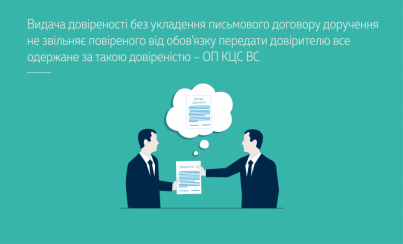Contact center of the Ukrainian Judiciary 044 207-35-46

The granting of a power of attorney on the basis of a verbal power of attorney agreement is a confirmation of the conclusion of such an agreement, and such legal relations are subject, inter alia, to Article 1006 of the Civil Code of Ukraine, which establishes the attorney's obligation to transfer to the principal everything received in connection with the execution of the mandate.
If the attorney and the principal do not agree on a time limit for the transfer of the items received in connection with the execution of the mandate, the transfer must take place immediately. In this case, the principal does not have to file a claim, as para. 3, part 1, Article 1006 of the Civil Code of Ukraine is an exception allowed by part 2, Article 530 of the Civil Code of Ukraine, which regulates the term of performance of an obligation.
The Joint Chamber of the Civil Cassation Court of the Supreme Court reached these conclusions, thereby ensuring the consistency of case law in the case concerning the claim for the recovery of funds.
The plaintiff stated that he had given the defendant a notarised power of attorney, which the defendant used to withdraw all the money belonging to him from his bank accounts without his knowledge. He was of the opinion that the defendant was obliged to return the funds to him on the basis of Article 1006 of the Civil Code of Ukraine, according to which an attorney is obliged to immediately transfer to the principal everything received in connection with the execution of the mandate.
The court of first instance, whose decision was upheld by the court of appeal, dismissed the claim. The courts held that the parties had a legal relationship of representation, but that it did not arise from the power of attorney agreement, but from a power of attorney that did not include the defendant's obligation as an attorney to transfer funds, report and provide supporting documents at the principal's request. The case file does not contain any evidence that the parties entered into a power of attorney agreement, so the provisions of Articles 1000-1006 of the Civil Code of Ukraine, to which the plaintiff refers, cannot be applied to the disputed legal relations.
The Joint Chamber of the Civil Cassation Court of the Supreme Court overturned the above judgments and remitted the case to the court of first instance for a new trial, reaching the following legal conclusions on the application of the law.
Chapter 68 of the Civil Code of Ukraine does not contain any special requirements as to the form of the power of attorney agreement and therefore does not exclude the conclusion of a power of attorney agreement in oral form.
Pursuant to Article 244 of the Civil Code of Ukraine and the principle of reasonableness, a power of attorney is a written document issued by one person to another for the purpose of representation before third parties. In other words, the power of attorney must stipulate the powers of the representative necessary to represent the principal to third parties, and not the representative's obligations to the person he or she represents (the principal). Moreover, the construction of contractual representation excludes a priori the possibility of executing a power of attorney that allows the representative to dispose of funds at his own discretion, as this contradicts the construction of civil law representation.
The issuance of a power of attorney on the basis of an oral power of attorney agreement is a confirmation of the conclusion of a power of attorney agreement, and it is obvious that such legal relations are subject to the provisions of, inter alia, Article 1006 of the Civil Code of Ukraine. In the absence of an agreement between the attorney and the principal to establish a time limit for the transfer of the property received in connection with the execution of the order, the transfer shall take place immediately. At the same time, the principal does not need to make a demand for the transfer of the goods received in connection with the execution of the mandate, as para. 3, part 1, Article 1006 of the Civil Code of Ukraine is an exception permitted by part 2, Article 530 of the Civil Code of Ukraine.
In view of the above, the courts of previous instances prematurely concluded that the parties had a representative relationship, but not from the power of attorney agreement, but on the basis of a power of attorney that does not contain the defendant's obligation as an attorney to transfer funds, report and provide supporting documents at the request of the principal.
During the retrial, the courts should take into account the conclusions of this resolution and consider, in accordance with the requirements of procedural law, the claimant's arguments that the defendant did not return the funds to him, as well as the defendant's arguments that he did return the funds.
The Resolution of the Supreme Court of 25 March 2024 in case No. 458/229/18 (proceedings No. 61-5932сво22) - https://reyestr.court.gov.ua/Review/118109072.
This and other legal positions of the Supreme Court can be found in the Database of Legal Positions of the Supreme Court - https://lpd.court.gov.ua.